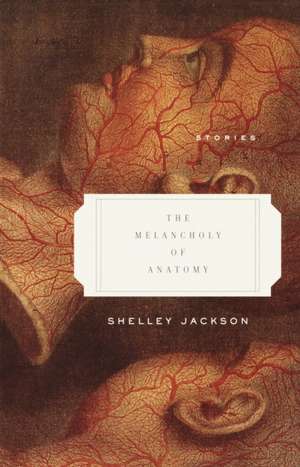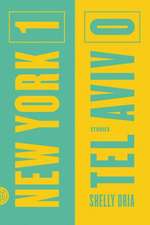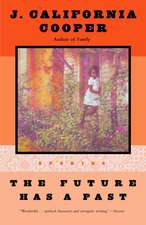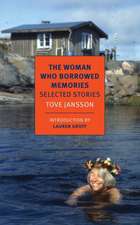The Melancholy of Anatomy: Stories
Autor Shelley Jacksonen Limba Engleză Paperback – 31 mar 2002
Here is the body turned inside out, its members set free, its humors released upon the world. Hearts bigger than planets devour light and warp the space around them; the city of London has a menstrual flow that gushes through its underground pipes; gobs of phlegm cement friendships and sexual relationships; and a floating fetus larger than a human becomes the new town pastor. In this debut story collection, Shelley Jackson rewrites our private passages, and translates the dumb show of the body into prose as gorgeous as it is unhygienic.
Preț: 116.35 lei
Nou
Puncte Express: 175
Preț estimativ în valută:
22.27€ • 23.16$ • 18.38£
22.27€ • 23.16$ • 18.38£
Carte disponibilă
Livrare economică 22 martie-05 aprilie
Preluare comenzi: 021 569.72.76
Specificații
ISBN-13: 9780385721202
ISBN-10: 038572120X
Pagini: 192
Dimensiuni: 135 x 202 x 14 mm
Greutate: 0.22 kg
Ediția:Anchor Books.
Editura: Anchor Books
ISBN-10: 038572120X
Pagini: 192
Dimensiuni: 135 x 202 x 14 mm
Greutate: 0.22 kg
Ediția:Anchor Books.
Editura: Anchor Books
Notă biografică
Shelley Jackson’s The Patchwork Girl is perhaps the best-known work in the genre of Electronic Literature. Jackson studied with Robert Coover at Brown University and now lives in New York City.
Extras
HEART
There are hearts bigger than planets: black hearts that absorb light, hope, and dust particles, that eat comets and space probes. Motionless, sullen dirigibles, they hang in the empty space between galaxies. We can't see them, but we know they're there, fattening.
They give off a kind of light, but it is a backwards light that races inward away from the onlooker to hide itself from view, so this light, whose color we would so much like to know (maybe it's a color we haven't seen before, for which we must sprout new eyes), looks more like darkness than any ordinary darkness, and seems to suck the sight from our eyes, and make itself visible in the form of a blind spot.
Dark hearts, heavier than weight itself. Too heavy for reality to bear, they punch a hole in it, and sink through into the dream underneath. They throb dully at the bottom of a gravity well. We might sit by the side and drop a line, if we knew what kind of bait to use, but if we hooked the heart, could we lift it? And if the melancholy behemoth sounded of its own accord, bothered by our flies and sinkers, and we netted it, wouldn't it collapse on the deck, exhausted by its own gravity?
No, it is unkind to wrest these hearts out of hiding. Toss pennies in the hole, instead. Dump a martini off the poop of the spaceship, blow a kiss through a porthole and clear off, friend.
The heart warps everything around it. Where nothing is, emptiness itself is twisted, its features distorted beyond all recognition. This is why people rail against the heart. It is bad enough to change everything that is, but when nothingness itself is altered, something must be done.
If we hold ourselves still, at the moment the year turns over, we can feel a faint beat. That is the black heart continuing its patient, serious work. What work? I am trying to find out. I have given my life to observing the hearts. Observing, of course, is the wrong word for the patient cultivation of blind spots, for trying to understand, by the ways in which, yes, I do not understand, what the heart is. In this investigation, invisibility is evidence, blindness the closest I may come to insight, the particular shape and tenor of ignorance, a clue and a scripture. When I can no longer see anything, I will know I am face to faceless with the heart. What, I sit at my telescope, straining my neck, my fingers numb claws, in hopes of catching sight of nothing at all? Yes. I will know it when I don't see it.
Is it right to call by the same name the tiny, ruby red "hearts" children dig up in the garden? Those rubbery knots, the size of crab apples, that bounce so high but so erratically, shoot off in unexpected directions, are forever being fished from under sofas and on top of bookshelves? That let out a squeak when rubbed? It's true that as they roll through the strict formations--parallel lines, rings, spirals--of children's games they sometimes resemble gay little planets, comets, and asteroids. But where is the pity, the mystery in these toys?
I do know of a rare game played in certain valleys in the Appalachians (its reach is tied to the vicissitudes of one or two family lines) in which one piece is chosen by lot as the Black Heart and plays a different role in the game than the others. As in other games, you must win as many hearts as you can. You must not take the Black Heart, however, or all the points you have won count against you. If you capture it by accident, you must try to force someone else to take it from you.
There is one other strategy. If, at the end of the game, you have lost all your hearts, including your shooter, and hold only the Black Heart in your pot, you collect all the hearts everyone else has won. A dangerous way to win, to seek a perfect loss. I have come to look on this game as a parable, in which all the secrets of the Black Heart are revealed.
There are hearts bigger than planets: black hearts that absorb light, hope, and dust particles, that eat comets and space probes. Motionless, sullen dirigibles, they hang in the empty space between galaxies. We can't see them, but we know they're there, fattening.
They give off a kind of light, but it is a backwards light that races inward away from the onlooker to hide itself from view, so this light, whose color we would so much like to know (maybe it's a color we haven't seen before, for which we must sprout new eyes), looks more like darkness than any ordinary darkness, and seems to suck the sight from our eyes, and make itself visible in the form of a blind spot.
Dark hearts, heavier than weight itself. Too heavy for reality to bear, they punch a hole in it, and sink through into the dream underneath. They throb dully at the bottom of a gravity well. We might sit by the side and drop a line, if we knew what kind of bait to use, but if we hooked the heart, could we lift it? And if the melancholy behemoth sounded of its own accord, bothered by our flies and sinkers, and we netted it, wouldn't it collapse on the deck, exhausted by its own gravity?
No, it is unkind to wrest these hearts out of hiding. Toss pennies in the hole, instead. Dump a martini off the poop of the spaceship, blow a kiss through a porthole and clear off, friend.
The heart warps everything around it. Where nothing is, emptiness itself is twisted, its features distorted beyond all recognition. This is why people rail against the heart. It is bad enough to change everything that is, but when nothingness itself is altered, something must be done.
If we hold ourselves still, at the moment the year turns over, we can feel a faint beat. That is the black heart continuing its patient, serious work. What work? I am trying to find out. I have given my life to observing the hearts. Observing, of course, is the wrong word for the patient cultivation of blind spots, for trying to understand, by the ways in which, yes, I do not understand, what the heart is. In this investigation, invisibility is evidence, blindness the closest I may come to insight, the particular shape and tenor of ignorance, a clue and a scripture. When I can no longer see anything, I will know I am face to faceless with the heart. What, I sit at my telescope, straining my neck, my fingers numb claws, in hopes of catching sight of nothing at all? Yes. I will know it when I don't see it.
Is it right to call by the same name the tiny, ruby red "hearts" children dig up in the garden? Those rubbery knots, the size of crab apples, that bounce so high but so erratically, shoot off in unexpected directions, are forever being fished from under sofas and on top of bookshelves? That let out a squeak when rubbed? It's true that as they roll through the strict formations--parallel lines, rings, spirals--of children's games they sometimes resemble gay little planets, comets, and asteroids. But where is the pity, the mystery in these toys?
I do know of a rare game played in certain valleys in the Appalachians (its reach is tied to the vicissitudes of one or two family lines) in which one piece is chosen by lot as the Black Heart and plays a different role in the game than the others. As in other games, you must win as many hearts as you can. You must not take the Black Heart, however, or all the points you have won count against you. If you capture it by accident, you must try to force someone else to take it from you.
There is one other strategy. If, at the end of the game, you have lost all your hearts, including your shooter, and hold only the Black Heart in your pot, you collect all the hearts everyone else has won. A dangerous way to win, to seek a perfect loss. I have come to look on this game as a parable, in which all the secrets of the Black Heart are revealed.
Recenzii
"Witty, multilayered, and beautifully written : a startling and memorable collection." —Ali Smith, author of Hotel World
"These tales prance and pirouette along the edge of the surreal. Sometimes they dive directly in, to bring back a sense of elegance, rightness, and great wisdom."—Samuel R. Delany, author of Dhalgren
"Shelley Jackson is a gifted writer . . . who, very playfully, very disturbingly, takes the body apart and puts it back together again, always in startlingly imaginative ways. These tales of the anatomy's ludicrous sorrows are deliciously crafted, maintaining always a fine balance between outrageous comedy and profound melancholy. She is . . . one of the most poised and original talents of her generation." —Robert Coover, author of Pricksongs & Descants
"She erases the boundaries between body and self, secretion and shedding, love and loathing, enveloping the reader in a slippery, icky, fascinating world." —The Village Voice Literary Supplement
"These tales prance and pirouette along the edge of the surreal. Sometimes they dive directly in, to bring back a sense of elegance, rightness, and great wisdom."—Samuel R. Delany, author of Dhalgren
"Shelley Jackson is a gifted writer . . . who, very playfully, very disturbingly, takes the body apart and puts it back together again, always in startlingly imaginative ways. These tales of the anatomy's ludicrous sorrows are deliciously crafted, maintaining always a fine balance between outrageous comedy and profound melancholy. She is . . . one of the most poised and original talents of her generation." —Robert Coover, author of Pricksongs & Descants
"She erases the boundaries between body and self, secretion and shedding, love and loathing, enveloping the reader in a slippery, icky, fascinating world." —The Village Voice Literary Supplement









